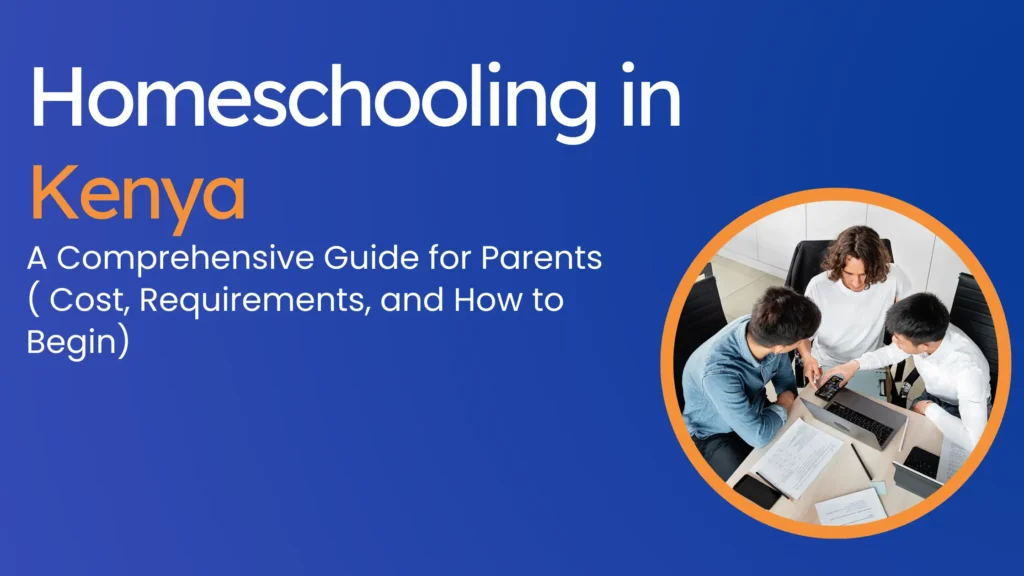Homeschooling in Kenya is becoming an increasingly popular alternative to traditional schooling. With growing concerns about the quality of education, exam pressure, school safety, and the need for more personalized learning, many Kenyan parents are turning to homeschooling as a viable option for their children.
But what exactly does homeschooling mean in the Kenyan context, how does it work, and what do you need to get started?
In this comprehensive guide to homeschooling in Kenya, we’ll cover everything parents should know — from the legal framework and curriculum options (CBC, 8-4-4, IGCSE, ACE) to the cost of homeschooling in Kenya, requirements, and practical tips for success.
This is your one-stop homeschooling resource in Kenya for 2025 and beyond.
What is Homeschooling in Kenya?

Homeschooling refers to the practice of educating children at home rather than sending them to a formal school. In this model, parents, guardians, or hired tutors take responsibility for the child’s education.
Unlike the one-size-fits-all approach in many Kenyan schools, homeschooling allows for a tailored learning environment that matches the child’s pace, interests, and strengths.
Why Choose Homeschooling in Kenya?
Parents across Kenya are asking: Why should I homeschool my child instead of taking them to a traditional school?
Here are the top reasons families are embracing homeschooling in Kenya:
1. Personalized Learning Experience
Traditional schools often adopt a one-size-fits-all model, where children must keep up with the teacher’s pace. In homeschooling, parents or tutors can customize lessons to match a child’s learning speed, strengths, and interests.
Example: A child who excels in mathematics can progress faster, while one who struggles with reading can take extra time without pressure. This flexibility leads to stronger retention and improved academic outcomes.
2. Flexible Schedule
Unlike rigid school timetables, homeschooling in Kenya allows families to design their own learning schedules. Lessons can take place in the morning, afternoon, evenings, or even weekends — depending on what works best for the family.
This flexibility is ideal for:
- Families who travel often
- Parents living in remote areas
- Children pursuing extracurricular passions like farming, music, coding, or sports
3. Safe and Supportive Learning Environment
Many Kenyan parents worry about issues in mainstream schools such as bullying, overcrowding, or insecurity. Homeschooling provides a safe and controlled learning space, free from negative distractions.
For children with special needs or health conditions, homeschooling also offers more personalized care.
4. Stronger Moral and Cultural Values
Homeschooling gives parents the freedom to integrate moral education, family values, and African cultural heritage into daily lessons.
For example, ACE homeschooling in Kenya is often chosen by Christian families because it combines academics with faith-based teachings.
5. Special Needs Support
Not every child thrives in a crowded classroom. Homeschooling in Kenya allows individualized support for children with dyslexia, ADHD, autism, or other learning needs. Parents can access special resources or hire tutors trained in special education.
6. Holistic Development Beyond Exams
Traditional schools emphasize national exams like KCPE and KCSE. While important, this exam-driven model often leaves little room for creativity.
Homeschooling in Kenya gives children more time to explore:
- Entrepreneurship
- Sports and arts
- Leadership and problem-solving
- Digital and future-ready skills
This ensures learners grow into well-rounded individuals — confident, adaptable, and innovative.
Is Homeschooling Legal in Kenya?

One of the most common questions is: “Is homeschooling legal in Kenya?”
Yes, homeschooling is legal in Kenya — but it must follow certain guidelines set by the Ministry of Education.
Legal Recognition of Homeschooling in Kenya
Kenya’s Constitution and the Basic Education Act recognize a parent’s right to choose the type of education their child receives. This includes public schools, private schools, and homeschooling.
Ministry of Education Guidelines
Parents who homeschool must ensure that:
- Their children are registered learners under the Ministry of Education.
- The curriculum used (CBC, 8-4-4, IGCSE, ACE) is recognized and provides pathways to further education.
- Homeschooled learners are assessed periodically to track progress.
Note: The Ministry does not dictate how parents teach at home but ensures that children meet essential learning milestones.
National and International Exams for Homeschoolers
Homeschooled learners in Kenya can sit for:
- KCPE & KCSE exams as private candidates through KNEC.
- IGCSE exams via Cambridge or Edexcel exam centers.
- SATs, ACT, or AP exams for US university entry.
- ACE program assessments under ACE providers.
This ensures homeschooled children have equal opportunities for university admission in Kenya and abroad.
Clearing Misconceptions
Some parents fear homeschooling is “illegal” or “unrecognized” in Kenya. In reality, as long as children are following a recognized curriculum and sit for the required exams, homeschooling is fully accepted by law.
How to Start Homeschooling in Kenya — Step-by-Step Guide

With the right mindset, starting homeschooling is not as hard as many people make it sound. It does require planning, commitment and consistency — but once you follow a clear process you’ll be surprised how smoothly it comes together. Below is a practical, step-by-step guide for Kenyan parents who want to begin homeschooling with confidence.
Step 1 — Decide on your curriculum (choose with the end in mind)
Your curriculum choice determines what your child learns, which exams they can sit, and future pathways (local university vs. international). Common options in Kenya:
- CBC (Competency-Based Curriculum) — aligns with national standards and KICD learning outcomes.
- 8-4-4 — still used by some families preparing for KCPE/KCSE.
- IGCSE (Cambridge / Edexcel) — international recognition, good for global university entry.
- ACE (Accelerated Christian Education) — faith-based, self-paced modules.
- Hybrid / Custom — mix elements (e.g., CBC early years + IGCSE later), or create a skills-focused program.
Decision checklist: Are you aiming for KCSE / Kenyan universities? Or international study? Budget? Child’s learning style? These answers will narrow the best curriculum for your family.
Curriculum Options Available for Homeschoolers in Kenya
One of the most important decisions parents make when starting homeschooling in Kenya is choosing the right curriculum. The curriculum shapes not only what your child learns but also which exams they will take, which universities they can access, and what career pathways are available later on.
Fortunately, Kenyan families today have a wide range of curriculum choices — from local systems like CBC and 8-4-4, to international options like IGCSE, ACE, and IB, as well as blended or customized approaches. Below is a breakdown of the main curriculum options for homeschoolers in Kenya:
1. The Kenyan 8-4-4 Curriculum
Although the government is gradually phasing it out, many homeschooling families still choose the 8-4-4 system.
- Why parents choose it: It prepares learners for the KCPE and KCSE exams, which remain widely recognized for admission into local universities and colleges.
- Advantages:
- Resources are widely available across Kenya (textbooks, revision materials, past papers).
- Familiar to most parents, tutors, and examiners.
- Recognized nationally by universities and employers.
- Limitations:
- Heavily exam-oriented, with less focus on creativity and skills.
- Being phased out, so younger learners may have fewer long-term opportunities in this track.
2. The Competency-Based Curriculum (CBC)
Kenya’s Competency-Based Curriculum (CBC) is the new official education system, designed to move away from rote learning and focus more on skills, competencies, and practical application.
- Why parents choose it: Homeschoolers who want their children aligned with Kenya’s current reforms often adopt CBC.
- Advantages:
- Flexible and adaptable for home-based learning.
- Encourages practical projects, creativity, and critical thinking.
- Keeps learners aligned with national education policies and reforms.
- Requirements: Parents can access KICD-approved CBC materials and ensure learning outcomes match school-going peers. This helps learners remain eligible for national assessments.
3. International Curricula
Many homeschooling families in Kenya prefer international curricula because they are globally recognized and open doors to universities abroad.
The most popular options include:
- IGCSE (Cambridge Curriculum):
- Flexible and subject-based.
- Offers learners the freedom to choose from a wide range of subjects.
- Highly recognized worldwide for university entry.
- ACE (Accelerated Christian Education):
- A structured, Christian-based curriculum.
- Learners study at their own pace using PACEs (workbooks).
- Strong focus on values, discipline, and individualized progress.
- IB (International Baccalaureate):
- Inquiry-based and holistic, encouraging critical thinking and research.
- Emphasizes personal growth, creativity, and global citizenship.
- Recognized worldwide and particularly valued in Western universities.
Support in Kenya: Several homeschooling centres in Nairobi, Nakuru, and Mombasa provide tutoring, exam registration, and resources for IGCSE, ACE, and IB — making these options very accessible.
4. Hybrid or Customized Approaches
Not all families stick to a single curriculum. Some parents blend systems to give their children the best of multiple worlds.
- Examples:
- Using CBC for the early years to build foundational skills, then transitioning to IGCSE for secondary education.
- Combining an international curriculum with custom subjects such as entrepreneurship, coding, faith-based studies, or life skills.
- Benefits:
- Flexible and child-centred.
- Allows parents to design an education pathway aligned with the child’s future goals.
- At Nakuru Homeschooling, we often remind parents that the curriculum should serve the child, not the other way around. A hybrid approach gives families the freedom to customize learning without being locked into a rigid system.
5. Resources and Support for Homeschooling Curricula in Kenya
Accessing curriculum materials in Kenya has never been easier. Parents can find resources through:
- Bookshops & publishers – CBC and 8-4-4 textbooks, workbooks, and revision guides.
- Online platforms & e-learning apps – Khan Academy, Coursera, Edmodo, School AI Global (Kenya-focused AI-powered learning).
- Homeschooling centres & tutors – Provide structured lessons, exam registration, and subject support.
- Parent networks & communities – Homeschooling co-ops help families share resources, organize group activities, and reduce costs.
By combining these resources, parents can provide a balanced and well-rounded homeschooling experience, no matter which curriculum path they choose.
Step 2 — Register & understand legal/exam requirements
Homeschooling is legal in Kenya but you must make sure your child is recognized and able to sit exams when needed.
- Register learners: If you plan to sit KCPE/KCSE, register the child as a private candidate with KNEC when it’s time. For IGCSE, register with an approved Cambridge/Edexcel centre. ACE students register with ACE providers.
- Keep records: Attendance, lesson plans, assessment results and portfolios — these are useful for accountability and transition to formal institutions.
- Check exam entry windows and requirements early so you’re not rushed later.
(If you’re unsure about forms or timelines, a homeschooling centre can help with registration.)
Step 3 — Gather learning resources & set up your space
Collect the materials you’ll need based on your chosen curriculum:
- Textbooks and workbooks (new or second-hand)
- Past papers and marking schemes (KCPE/KCSE/IGCSE past papers are essential)
- Online platforms and video lessons (Khan Academy, YouTube Edu, curriculum-specific providers, and tools like SchoolAI)
- Stationery, printer, simple science kit for experiments, age-appropriate manipulatives for younger learners
Create a dedicated, distraction-free learning space — a small table/desk with good light is enough to start.
Step 4 — Create a realistic learning schedule
Structure matters. A timetable gives rhythm and shows progress.
- Primary (lower) years: 2–4 focused learning hours/day split across reading, numeracy, and activities.
- Upper primary / secondary: 3–6 hours/day depending on subjects and workload.
- Balance core subjects (math, language, science) with electives, physical activity and free time.
- Plan weekly themes (e.g., Science Wednesday, Field-trip Friday) to keep learning varied.
Be flexible — one of homeschooling’s strengths — but keep consistent routines.
Step 5 — Teach, guide or hire tutors (role clarity)
You don’t have to be the sole teacher. Choose a model that fits your skills, time and budget:
- Parent-led: Parent plans lessons and teaches (common for early years). Great for close mentorship and values integration.
- Tutor-assisted: Hire tutors for specialist or exam-heavy subjects (chemistry, physics, advanced math, languages). Tutors can be part-time in-person or online.
- Centre-supported / Hybrid: Children study at home but attend a homeschooling centre or co-op for certain classes, labs and social activities.
Role of parents vs tutors (quick guide)
- Parents: curriculum selection, daily routine, pastoral care, values, monitoring progress, portfolio keeping.
- Tutors: subject expertise, exam technique, covering advanced topics, providing mock tests and practical labs.
- Best practice: communicate expectations with tutors, set learning goals together, and keep a shared progress tracker.
Step 6 — Track progress & prepare for exams
Assessment turns learning into evidence and helps you course-correct.
- Use regular quizzes, assignments, and projects.
- Keep a learning portfolio (samples of work, tests, projects, photos).
- Start focused exam preparation using past papers several months before the exam period (mock exams simulate test conditions).
- If your child is a private candidate (KCPE/KCSE) or registered for IGCSE, confirm exam registration deadlines well in advance.
Support from Homeschooling Centres in Kenya

Homeschooling centres provide practical scaffolding for busy parents:
- Curriculum advice & customised lesson plans
- Qualified tutors and specialist lessons (labs, languages, arts)
- Group classes, co-ops and socialisation opportunities for learners
- Exam registration assistance and mock tests
- Resource libraries & admin support
Nakuru Homeschooling (example): helps parents choose a curriculum, access tutors, set up home learning plans and register for exams — plus offers community meetups for social learning.
Practical tips & common sense fixes
- If you work full-time: start with mornings, hire after-school tutors, or join a co-op.
- Budget-conscious families: use free online resources, second-hand books, and shared tutor sessions in co-ops.
- Worried about socialisation: schedule group activities, sports, church groups, or community classes weekly.
Requirements for Homeschooling in Kenya
Before beginning the journey, many parents ask: “What do I need to legally homeschool my child in Kenya?” The requirements fall into two categories:
- Legal requirements set by the Ministry of Education.
- Practical requirements that make homeschooling smooth and effective.
1. Legal Requirements for Homeschooling in Kenya
Homeschooling is legal in Kenya, but it must align with government guidelines. Here are the key steps every parent should know:
- Register with the Ministry of Education – Parents are expected to register their children as homeschooled learners. This ensures they are recognized in national education statistics and can sit for official exams.
- Curriculum approval – Parents may choose CBC, 8-4-4, IGCSE, ACE, or another internationally recognized system. The Ministry requires that any chosen curriculum meets minimum standards.
- Examination registration – CBC and 8-4-4 learners must register as private candidates for KCPE or KCSE. For IGCSE and ACE, registration is done through approved exam centres.
- Record-keeping – Attendance, lesson plans, and assessment records should be maintained, as they may be requested during inspection.
- Compliance with child protection laws – Parents must provide quality education and ensure the child’s right to learn is not violated.
2. Practical Requirements for Homeschooling in Kenya
Beyond the legal framework, families must also prepare the right home environment:
- Dedicated learning space – A quiet, well-lit area fosters focus and structure.
- Curriculum & learning materials – Gather textbooks, workbooks, online subscriptions, or ACE PACEs, depending on your curriculum choice and budget.
- Schedule & routine – A consistent timetable helps learners meet milestones and avoids homeschooling becoming “too relaxed.”
- Parental or tutor involvement – Decide if you will personally teach, or whether to hire subject-specific tutors for areas like math, science, or languages.
- Assessment & progress tracking – Regular tests, assignments, and projects ensure learners stay on track.
- Community support – Join homeschooling groups, co-ops, or support networks for peer interaction, shared resources, and extracurriculars.
- Technology & digital tools – Reliable internet, a computer/tablet, and educational platforms (like Khan Academy, Google Classroom, or School AI Global) make modern homeschooling effective.
Challenges of Homeschooling in Kenya (and How to Overcome Them)

While homeschooling offers flexibility, it also comes with challenges. Here are the most common ones — and practical solutions:
- Time commitment for parents
- Challenge: Parents may feel overwhelmed teaching full-time.
- Solution: Create a structured timetable and hire part-time tutors for specialized subjects.
- Cost of resources and tutors
- Challenge: International curricula like IGCSE or ACE can be expensive.
- Solution: Start with CBC/8-4-4 for affordability, share materials through co-ops, or use free resources like Khan Academy.
- Socialization and peer interaction
- Challenge: Fear that homeschooled children will lack social skills.
- Solution: Encourage extracurriculars (sports, church, music), and join Kenyan homeschooling groups for field trips and group studies.
- Access to qualified tutors
- Challenge: Parents may struggle with specialized subjects.
- Solution: Hire tutors or enroll in homeschooling centres in Nairobi, Nakuru, or Mombasa, which provide expert teachers.
- Lack of clear information
- Challenge: Confusion about homeschooling laws and exam registration.
- Solution: Stay updated with Ministry guidelines, consult homeschooling centres, and connect with associations for accurate updates.
- Maintaining motivation and consistency
- Challenge: Without a school structure, children may lose focus, and parents may feel burnout.
- Solution: Use interactive learning methods (videos, projects, experiments) and celebrate milestones to keep motivation high.
Final Tips for Successful Homeschooling in Kenya
- Create a dedicated learning space at home.
- Stick to a daily routine to build discipline.
- Mix offline and online resources for variety.
- Track progress with regular tests and projects.
- Join homeschooling groups for peer support and activities.
- Stay patient and flexible — homeschooling is a journey, not a race.
Homeschooling in Kenya as a Path to Academic and Personal Growth
Homeschooling in Kenya is no longer a fringe option. It is a growing movement among families seeking flexibility, safety, and a personalized approach to education. From CBC and 8-4-4 to international curricula like IGCSE and ACE, parents now have multiple pathways for their children’s success.
Yes, challenges exist — costs, time, and socialization — but with the right preparation, support systems, and digital tools, homeschooling becomes not just possible, but rewarding.
At its heart, homeschooling is about nurturing a child’s talents, values, and academic excellence in a supportive home environment.
Start Your Homeschooling Journey with Nakuru Homeschooling
If you’re ready to begin homeschooling in Kenya but don’t know where to start, you don’t have to walk alone.
At Nakuru Homeschooling, we help families:
- Navigate legal registration with the Ministry of Education.
- Choose the right curriculum (CBC, IGCSE, ACE, or hybrid).
- Access affordable tutors and resources.
- Join a vibrant community of homeschooling parents and learners.
Take the first step today:
- Visit our website for free resources and curriculum guides.
- Subscribe to our newsletter for expert homeschooling tips.
- Contact us to book a consultation and begin your homeschooling journey with confidence.
Nakuru Homeschooling Admission— your trusted partner in shaping Kenya’s future through personalized education.

Pingback: How to Start Homeschooling in Kenya: Step-by-Step Guide for Parents - Nakuru Homeschooling